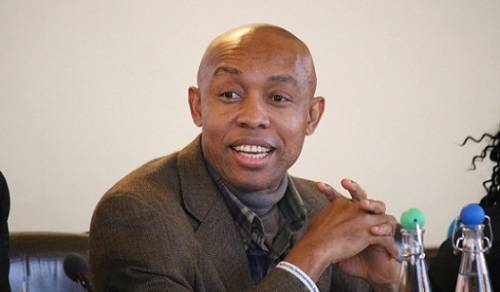Political Issues
Buhari’s Executive Order No. 6 of 2018 Is An Unlawful Power-Grab -By Chidi Odinkalu


Professor Chidi Odinkalu
When he ran to be Nigeria’s president for the fourth time in 2014, Muhammadu Buhari pleaded that he was a converted democrat. Since Nigerians granted him his wish in 2015, he appears to have found it difficult either to show off the new livery of a converted democrat or to shake off his old habits as a humorless dictator. In his Presidential Executive Order (PEO), No. 6 of 2018, President Buhari buries any illusions as to his preference.
PEO No. 6 of 2018 sets out to address “the Preservation of Suspicious Assets Connected with Corruption and Other Relevant Offences.” Its contents fall into two categories: those things in it which are not needless or are manifestly outside the powers of the President. At best, it’s an own goal. At worst, it’s an awful advertisement of presidential hubris and overreach.
This Executive Order comprises a preamble, seven sections, two schedules and five essential features.
First, PEO No. 6 begins with an acknowledgement that “corruption constitutes an unusual and extraordinary threat to the well-being, national security and stability of the country’s political and economic systems.” This is a rather pompous and prolix way of saying that corruption threatens national security. This point is both self-evident and well acknowledged in policy and scientific literature. In policy terms, such re-statement by a president is of little or no value. The best that can be said of this is that in linking corruption to national security in the way that the preamble to PEO No. 6 does, President Buhari arguably contributes to Nigeria’s national security doctrine.
Second, the PEO purports, “without prejudice to any laws or existing suits” to “protect from dissipation” the “assets of any Nigeria citizens within the territory of the Federal Republic of Nigeria…. known to be a current or former government official” or a politically exposed person, who is or has been “complicit in or has… engaged in corrupt practices.” The problem is that the determination whether or not a person is complicit in corrupt practices is the business of judges not of presidents. It follows evidence not fantasy. The judiciary also has powers to easily protect from dissipation any assets covered by pending prosecution. When President Buhari ventures into this territory, he clearly forgets he can no longer rule by military decree.
Third, PEO No. 6 designates in the first schedule to the Order, specific cases and persons to whom it applies. In particular, the PEO takes ten pages to list 155 pending court casescovered by it. The named cases cover such persons as former Inspector-General of Police, Sunday Ehindero;ex-Abia State Governor, Orji Kalu; ex-Adamawa State Governor, Murtala Nyako; ex-Benue State Governor, Gabriel Suswam; ex-Zamfara State Governor, Sani Yerima; ex-Katsina State Governor, Ibrahim Shema; ex-Sokoto State Governor, Attahiru Bafarawa; ex-Jigawa States Governors, Saminu Turaki and Sule Lamido; ex-Niger State Governor, Babangida Aliyu; ex-Oyo State Governors, Rasheed Ladoja and Alao-Akala; ex-Ogun State Governor, Gbenga Daniel; ex-Enugu State Governor, Chimaroke Nnamani, ex-Kebbi State Governor, Dakingari and former National Security Adviser, Sambo Dasuki. Also listed are cases involving some dead people such as former Nassarawa State Governor, Aliyu Akwe Doma and the recently deceased former Chief Judge of Enugu State, Innocent Umezulike. In effect, the President seeks through this Order to direct judges on what to do in cases before them. Again, whoever advised President Buhari that it is within his powers to issue such an order served him very poorly indeed. If he so advised himself, then he suffers from terrible misapprehensions about both his station,the scope of his powers and about his constitutional literacy.
Fourth, PEO No. 6 confers on the Attorney-General of the Federation, the “power to co-ordinate the implementation of this Order”. Additionally enforcement agencies named in the Order are required to communicate the outcomes of their investigations to the Attorney-General so that he can “immediately commence or direct the commencement of appropriate process(es) either administratively or judicially as the case may be.” However, the powers of enforcement agencies, such as the Economic and Financial Crimes Commission (EFCC) or the Independent Corrupt Practices Commission (ICPC) are clearly spelt out in the laws. Under the constitution, the Attorney-General clearly has powers to take over or terminate prosecutions but there is nothing that requires the agencies to wait on him for initiative. The fact that the President feels called upon to issue such a directive suggests some inter-agency rivalry. If so, it is no resolution for the President to resort to retrenching clear legal provisions through the assertion of powers he does not have. What he seeks can only be achieved by primary legislation. The destination address for that is the National Assembly.
Fifth, PEO No. 6 purports to wield a big stick and provides that heads of 20 agencies named in the second schedule to the Order, “shall take personal responsibility and be subject to appropriate sanctions for any failure to comply with this order.” The threat of sanctions in this way cannot, however, cure the underlying unlawfulness in the powers that the President seeks to assert. This threat is empty.
Finally, the PEO extends the scope of corruption to cover “other relevant offences”, including “terrorism, financing of terrorism, kidnapping, sponsorship of ethnic or religious violence, economic sabotage, cases of economic and financial crimes”, and to a very nebulous category of “acts contributing to the economic adversity of the Federal Republic of Nigeria.” These may be quite serious issues but nearly all of them are covered by existing laws. Those that are not perhaps should be. Again, the National Assembly is the right destination for these powers.
PEO No. 6 is a squalid attempt at a power grab or an untheorized act of constitutional vandalism in defiance of the separation of powers in the 1999 Constitution. It’s not worth the paper on which it is written.

















